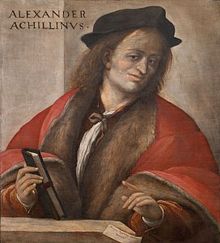Alessandro Achillini
Alessandro Achillini (pron. Ak-) (born October 20 or 29, 1463 in Bologna ; † August 2, 1512 ibid) was a scholastic philosopher and anatomist from Italy and an advocate of the teachings of Wilhelm von Ockham .
Alessandro Achillini received his doctorate in philosophy and medicine in 1484. He then taught medicine in his native Bologna , where he distinguished himself as an anatomist and in philosophy as a representative of averroism as well as the theoretical foundations of the medical renaissance. In Padua, where he lived from 1506 to 1508 and taught philosophy before going back to Bologna, he had fully embraced averroism. Unlike Averroes , however, he denied the doctrine of the unity of the intellect.
Among his writings on philosophy, opera omnia, which were initially recorded in Venice in 1508 in a single voluminous tome and which were reprinted in 1545 and 1568 with noteworthy notes, the most important De intelligentiis is in five books. In some medical writings he is considered to be the discoverer of the ossicular hammer and anvil .
Alessandro Achillini was the older brother of Giovanni Filoteo Achillini and the great-uncle of Claudio Achillini .
Works (selection)
- Corporis humani Anatomia (Venice, 1516–1524)
- Anatomicae Annotationes (Bologna, 1520)
literature
- Daniel Schäfer : Achillini, Alessandro. In: Werner E. Gerabek , Bernhard D. Haage, Gundolf Keil , Wolfgang Wegner (eds.): Enzyklopädie Medizingeschichte. de Gruyter, Berlin / New York 2005, ISBN 3-11-015714-4 , p. 5.
- Herbert Stanley Matsen: Alessandro Achillini (1463-1512) and His Doctrine of 'Universals' and 'Transcendentals'. A Study in Renaissance Ockhamism. Associates University Presses, London 1974, ISBN 0-8387-1221-8 .
| personal data | |
|---|---|
| SURNAME | Achillini, Alessandro |
| BRIEF DESCRIPTION | Italian philosopher and doctor |
| DATE OF BIRTH | October 20, 1463 |
| PLACE OF BIRTH | Bologna |
| DATE OF DEATH | August 2, 1512 |
| Place of death | Bologna |
